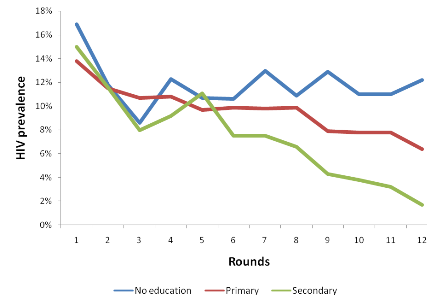Education impacts on health in two ways; firstly through teaching that enables children to learn specifically about health (often known as skills-based health education) and secondly through the educational process as a whole which provides skills such as critical thinking and making choices that enable children to opt for healthy lifestyles. The impact of the latter is seen particularly in the overall impact of education on the spread of HIV.Skills-based health education
Skills-Based Health Education, also referred to as Life Skills-Based Education is an interactive process of teaching and learning which enables learners to acquire knowledge and to develop attitudes and skills which support the adoption of healthy behaviours. Skills-based health education uses participatory and gender-sensitive teaching and learning methods allowing all participants (including the facilitator) equal opportunities to listen to, and learn from, each other.
The approach can use different learning styles including self-guided and experiential learning (learning by doing), which are based on the natural processes by which children acquire knowledge, attitudes, skills and ultimately behaviours. For more in-depth information on this, visit UNICEF Lifeskills.
Skills-based health education is widely applicable to a range of conditions where knowledge, behaviours, attitudes and skills play a critical role in combating disease including vector borne infections such as malaria; water and sanitation related diseases such as diarrheal diseases, trachoma and schistosomiasis; nutrition related conditions such as micronutrient deficiencies and other forms of malnutrition.
Using the example of helminth infections, act through promoting knowledge of areas such as symptoms and transmission; behaviours that are specifically relevant to the transmission of helminths in different communities; attitudes such as responsibility for personal, family and community health; and skills such as the ability to communicate messages about worm infection to families, peers and members of the community (WHO 1996).
Skills-based health education enhances the quality of the content of education, by addressing issues relevant to the lives of learners. At present, it is often applied to health and social issues which are not traditionally included in the academic curriculum and which demand the adoption of positive behaviours by young people (e.g., health, human rights and gender equality). However, skills-based content and methods can also enhance the quality of traditional subjects such as literacy and numeracy by making them more relevant and engaging for the learners (UNICEF Lifeskills).
Impact of Education on Health: protection against HIV infection:

Evidence from a long term study in rural Uganda, conducted over an 11 year period from 1990 to 2001, covering different stages of the epidemic, demonstrates that education itself has a protective influence on HIV/AIDS prevention (De Walque 2005). The findings suggest that over a decade, educated young adults, especially females, became more likely to respond to HIV/AIDS information and prevention campaigns by effectively reducing their sexual risk behaviour.
Click here to see more about the relationship between HIV and Education in the new Ed SIDA Manual for Modelling the impact of HIV on Education Systems.
Key documents
- Jukes, MCH, LJ Drake, DAP Bundy (2008). School Health, Nutrition and Education for All: Levelling the Playing Field. Cambridge, MA, CABI Publishing.
- de Walque, D, JS Nakiyingi-Miiro, J Busingye, JA Whitworth (2005)“Changing association between schooling levels and HIV-1 infection over 11 years in a rural population cohort in south-west Uganda.” Tropical Medicine & International Health:Volume 10(10) October 2005 p 993-1001.
- WHO (1996) Strengthening Interventions to reduce helminth Infections: An entry point for the development of Health-Promoting Schools.
- USAID (2011) Designing Effective Education Programs for School Health Programs
- FRESH Focusing Resources on Effective School Health

